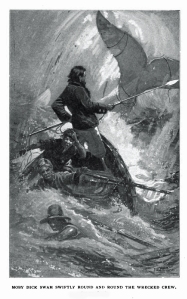Consider the subtleness of the sea; how its most dreaded creatures glide under water, unapparent for the most part, and treacherously hidden beneath the loveliest tints of azure. Consider also the devilish brilliance and beauty of many of its most remorseless tribes, as the dainty embellished shape of many species of sharks. Consider, once more, the universal cannibalism of the sea; all whose creatures prey upon each other, carrying on eternal war since the world began.
Consider all this; and then turn to the green, gentle, and most docile earth; consider them both, the sea and the land; and do you not find a strange analogy to something in yourself? For as this appalling ocean surrounds the verdant land, so in the soul of man there lies one insular Tahiti, full of peace and joy, but encompassed by all the horrors of the half-known life. God keep thee! Push not off from that isle, thou canst never return!
~Moby-Dick; or the Whale, Herman Melville.
The fiery poetry of Melville’s epic. Moby-Dick; or the Whale is a titanic overview of man’s place within nature and the power that nature has over man. A teacher once described Melville as an anti-transcendentalist, meaning he devalued nature in contrast to Thoreau or Emerson. I disagree; I think Melville places tantamount value on the power of nature, and that’s why it’s so destructive to man. Because of the scientific approach to whaling in the novel’s many whaling scenes, some people believe Melville took a purely materialist viewpoint of nature. It can be quantified and dissected and used by man for our purposes. But the language in the passage above doesn’t suggest that. I believe Melville’s philosophy of nature has roots in scientific fact, but evolves from it to spiritual adoration. Ishmael’s musings are too ethereal for a simple pragmatist; they stretch deep into the ontology and ethics and give biblical depth to the novel.
I don’t use that word lightly: the many names taken from the Bible, the entire Jonah parallel, the lightning strike on the ship that ignites its mast creating burning cross/holy trinity imagery. The novel is as spiritual as it is scientific, striking a firm balance between the two when observing man and the universe. Consider the pulpit the priest speaks from in one of the opening scenes: it’s made out of a decommissioned whaling ship. Nantucket is a whaling town, so it makes sense that its church and priest would be leftovers of the industry. The priest makes allusions to the story of Jonah in his sermon and connects the whaling trade to life. The scene a microcosm of the novel, which is a microcosm of life. There are volumes to be said about how the Pequod represents the world of man floating through the universe, and how the white whale represents swirling chaos dragging us into oblivion.
But I’ll stick with this for now: Melville did have spiritual commentary on nature that drew from man’s spiritual foundation and linked it to the scientific dissection of nature’s elements. He shows how each are dogmatic and potentially self-destructive, as is the nature of man. Both halves dichotomy are essential to mention because both are the response of man to nature, and that is what Moby-Dick is about at its core. Ahab is maddened by the whale, while Ishmael is fascinated. Ahab is killed by this madness, while Ishmael is saved by his resourcefulness. It’s clear that Melville believes certain responses are destructive, but that doesn’t mean he lends no spiritual value to nature. On the contrary, he lends it all spiritual import. There is a maddening surplus of imagery and allegory in this work of art, and for good reason. It’s about everything.
Towards thee I roll, thou all-destroying but unconquering whale; to the last I grapple with thee; from hell’s heart I stab at thee; for hate’s sake I spit my last breath at thee. Sink all coffins and all hearses to one common pool, and since neither can be mine, let me tow to pieces, while still chasing thee, though tied to tee, thou damned whale! Thus, I give up the spear!
